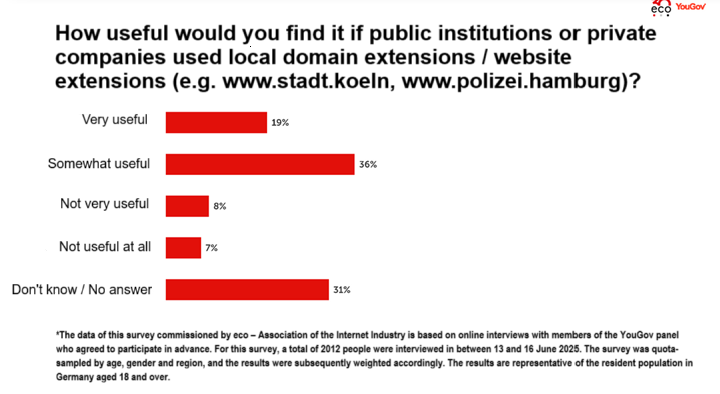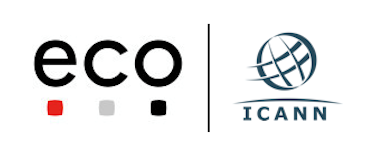.hamburg instead of .com? Majority of Germans Support More Regionality Online
- New application round for domain ending allocation in 2026: Time to now prepare your application for your own domain ending with ICANN
- 55% of respondents** consider geographical Internet endings to be somewhat useful or very useful
- Only 7% of respondents say local domain extensions are not useful at all
It’s a phenomenon that probably all Internet users encounter on a daily basis and has become increasingly noticeable since the boom of extensions such as “.ai” or “.tv”: specific Internet extensions, known as Top-Level Domains (TLDs), which appear at the very end of a web address. In addition to well-known endings such as “.de” or “.com”, there is now a wide range of abbreviations that refer to industries, companies or locations. In the German population, local TLDs (geoTLDs) such as “.cologne” or “.hamburg” are gaining particularly popularity: According to a recent YouGov survey commissioned by eco – Association of the Internet Industry*, 55 per cent** of respondents consider local extensions for public institutions and private companies to be useful. Only 7 per cent state that location-based Internet extensions are not useful at all.
Local patriotism and more security in the digital space
The popularity of various web abbreviations is easy to explain: they are not only technical identifiers of a web address, but also serve as digital flagships for companies, institutions and organisations. Thomas Rickert, Director Names & Numbers at eco, highlights the advantages of local extensions: “geoTLDs enable companies and organisations to engage in targeted marketing with clear geographical identification. This is especially appealing for entities with strong regional ties, such as cities, authorities, tourist regions or the gastronomic sector.” According to Rickert, geographical endings not only strengthen digital identity with a regional connection, but also create trust and recognisability.
At the same time, proprietary TLDs can mean more security, data protection and trust for users when the endings require, for example, mandatory DNSSEC use, encrypted communication or curated domain allocation. “TLDs can create security zones on the Internet. For municipalities and industries with sensitive services – like healthcare, education, or public administration – they can offer real added value,” says Rickert.
Rare opportunity: applications for new TLDs possible at ICANN in 2026
While TLDs are technically and administratively managed by registrars, the Internet Corporation for Assigned Names and Numbers (ICANN) holds the reins for the Domain Name System (DNS) and is responsible for the allocation and regulation of all generic TLDs.
The last time interested parties had the opportunity to apply for a new extension was in 2012. Now there will be another chance next year – according to Rickert, a “special opportunity for companies and regions to gain more visibility and security online.” It doesn’t matter whether applicants wish to apply for a geographical, generic or company-specific TLD. “The application process is open to all types of TLDs,” Rickert confirms. He recommends that interested parties get to grips with the application process as soon as possible: “The allocation process for new Internet extensions is complex – but it’s worth it.”
eco as a point of contact for domain matters
As the Association of the Internet Industry, eco has been active in TLD policy work for over 30 years. The association’s members manage more than 70 per cent of all domain registrations worldwide. With its Names & Numbers Competence Group, eco serves as the direct point of contact for anyone planning their own TLD and regularly organises information events on topics related to domains.

*The data of this survey commissioned by eco – Association of the Internet Industry is based on online interviews with members of the YouGov panel who agreed to participate in advance. For this survey, a total of 2012 people were interviewed in between 13 and 16 June 2025. The survey was quota-sampled by age, gender and region, and the results were subsequently weighted accordingly. The results are representative of the resident population in Germany aged 18 and over.
** The displayed percentage value is based on the aggregation of two adjacent scale points (Top-2-Box).




